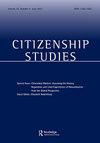From acts of citizenship to transnational lived citizenship: potential and pitfalls of subversive readings of citizenship
IF 1.9
3区 社会学
Q3 POLITICAL SCIENCE
引用次数: 1
Abstract
ABSTRACT I interrogate the emancipatory potential of the activist turn in the study of citizenship, ranging from the conceptualisation of citizenship as everyday practices and/or resistance to exclusionary nation-state practices to forms of transnational lived citizenship that have become ever more prevalent with globalisation. I argue that such an activist understanding has the potential to advance the well-being of populations that lack legal status. It can also foster rights-based claims for inclusion and create allegiances with different societal actors, locally, nationally, as well as globally. At the same time, such a partly subversive definition of citizenship as practice risks being unduly romanticised in its emancipatory potential. I conclude that activist citizenship as a category of analysis and practice is at its most emancipatory when focusing on new subjectivities that emerge in mobile transnational lives, often literally in the geographical space of the city.从公民行为到跨国生活公民:公民身份的颠覆性解读的潜在和陷阱
我将探讨公民研究中激进主义转向的解放潜力,从将公民概念化为日常实践和/或对排他性民族国家实践的抵制,到随着全球化而变得越来越普遍的跨国生活公民形式。我认为,这种积极的理解有可能促进缺乏法律地位的人口的福祉。它还可以促进基于权利的包容性要求,并在地方、国家和全球范围内与不同的社会行动者建立忠诚关系。与此同时,这种部分颠覆性的将公民身份定义为实践的做法,有可能在其解放潜力方面被过度浪漫化。我的结论是,当关注在流动的跨国生活中出现的新主体性时,作为一种分析和实践的范畴,活动家公民身份最具解放性,通常是在城市的地理空间中出现的。
本文章由计算机程序翻译,如有差异,请以英文原文为准。
求助全文
约1分钟内获得全文
求助全文
来源期刊

Citizenship Studies
POLITICAL SCIENCE-
CiteScore
3.60
自引率
11.10%
发文量
85
期刊介绍:
Citizenship Studies publishes internationally recognised scholarly work on contemporary issues in citizenship, human rights and democratic processes from an interdisciplinary perspective covering the fields of politics, sociology, history and cultural studies. It seeks to lead an international debate on the academic analysis of citizenship, and also aims to cross the division between internal and academic and external public debate. The journal focuses on debates that move beyond conventional notions of citizenship, and treats citizenship as a strategic concept that is central in the analysis of identity, participation, empowerment, human rights and the public interest.
 求助内容:
求助内容: 应助结果提醒方式:
应助结果提醒方式:


